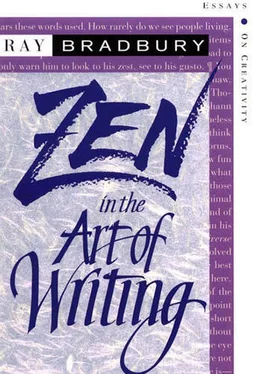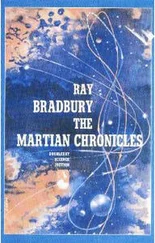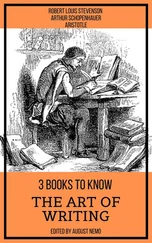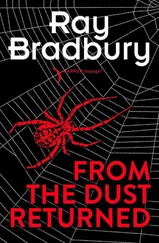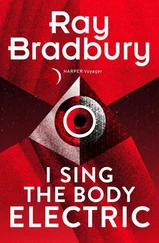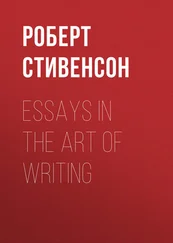Ray Bradbury - Zen in the Art of Writing
Здесь есть возможность читать онлайн «Ray Bradbury - Zen in the Art of Writing» весь текст электронной книги совершенно бесплатно (целиком полную версию без сокращений). В некоторых случаях можно слушать аудио, скачать через торрент в формате fb2 и присутствует краткое содержание. Жанр: Биографии и Мемуары, на английском языке. Описание произведения, (предисловие) а так же отзывы посетителей доступны на портале библиотеки ЛибКат.
- Название:Zen in the Art of Writing
- Автор:
- Жанр:
- Год:неизвестен
- ISBN:нет данных
- Рейтинг книги:4 / 5. Голосов: 1
-
Избранное:Добавить в избранное
- Отзывы:
-
Ваша оценка:
- 80
- 1
- 2
- 3
- 4
- 5
Zen in the Art of Writing: краткое содержание, описание и аннотация
Предлагаем к чтению аннотацию, описание, краткое содержание или предисловие (зависит от того, что написал сам автор книги «Zen in the Art of Writing»). Если вы не нашли необходимую информацию о книге — напишите в комментариях, мы постараемся отыскать её.
Zen in the Art of Writing — читать онлайн бесплатно полную книгу (весь текст) целиком
Ниже представлен текст книги, разбитый по страницам. Система сохранения места последней прочитанной страницы, позволяет с удобством читать онлайн бесплатно книгу «Zen in the Art of Writing», без необходимости каждый раз заново искать на чём Вы остановились. Поставьте закладку, и сможете в любой момент перейти на страницу, на которой закончили чтение.
Интервал:
Закладка:
Do not, for money, turn away from all the stuff you have collected in a lifetime.
Do not, for the vanity of intellectual publications, turn away from what you are-the material within you which makes you individual, and therefore indispensable to others.
To feed your Muse, then, you should always have been hungry about life since you were a child. If not, it is a little late to start. Better late than never, of course. Do you feel up to it?
It means you must still take long walks at night around your city or town, or walks in the country by day. And long walks, at any time, through bookstores and libraries.
And while feeding, How to Keep Your Muse is our final problem.
The Muse must have shape. You will write a thousand words a day for ten or twenty years in order to try to give it shape, to learn enough about grammar and story construction so that these become part of the Subconscious, without restraining or distorting the Muse.
By living well, by observing as you live, by reading well and observing as you read, you have fed Your Most Original Self. By training yourself in writing, by repetitious exercise, imitation, good example, you have made a clean, well-lighted place to keep the Muse. You have given her, him, it, or whatever, room to turn around in. And through training, you have relaxed yourself enough not to stare discourteously when inspiration comes into the room.
You have learned to go immediately to the typewriter and preserve the inspiration for all time by putting it on paper.
And you have learned the answer to the question asked earlier: Does creativity like loud or soft voices?
The loud, the passionate voice seems to please most. The voice upraised in conflict, the comparison of opposites. Sit at your typewriter, pick characters of various sorts, let them fly together in a great clang. In no time at all, your secret self is roused. We all like decision, declaration; anyone loudly for, anyone loudly against.
This is not to say the quiet story is excluded. One can be as excited and passionate about a quiet story as any. There is excitement in the calm still beauty of a Venus de Milo . The spectator, here, becomes as important as the thing viewed.
Be certain of this: When honest love speaks, when true admiration begins, when excitement rises, when hate curls like smoke, you need never doubt that creativity will stay with you for a lifetime. The core of your creativity should be the same as the core of your story and of the main character in your story. What does your character want, what is his dream, what shape has it, and how expressed? Given expression, this is the dynamo of his life, and your life, then, as Creator. At the exact moment when truth erupts, the subconscious changes from wastebasket file to angel writing in a book of gold.
Look at yourself then. Consider everything you have fed yourself over the years. Was it a banquet or a starvation diet?
Who are your friends? Do they believe in you? Or do they stunt your growth with ridicule and disbelief? If the latter, you haven't friends. Go find some.
And finally, have you trained well enough so you can say what you want to say without getting hamstrung? Have you written enough so that you are relaxed and can allow the truth to get out without being ruined by self-conscious posturings or changed by a desire to become rich?
To feed well is to grow. To work well and constantly is to keep what you have learned and know in prime condition. Experience. Labor. These are the twin sides of the coin which when spun is neither experience nor labor, but the moment of revelation. The coin, by optical illusion, becomes a round, bright, whirling globe of life. It is the moment when the porch swing creaks gentle and a voice speaks. All hold their breath. The voice rises and falls. Dad tells of other years. A ghost rises off his lips. The subconscious stirs and rubs its eyes. The Muse ventures in the ferns below the porch, where the summer boys, strewn on the lawn, listen. The words become poetry that no one minds, because no one has thought to call it that. Time is there. Love is there. Story is there. A well-fed man keeps and calmly gives forth his infinitesimal portion of eternity. It sounds big in the summer night. And it is, as it always was down the ages, when there was a man with something to tell, and ones, quiet and wise, to listen.
The first movie star I remember is Lon Chaney.
The first drawing I made was a skeleton.
The first awe I remember having was of the stars on a summer night in Illinois.
The first stories I read were science-fiction stories in Amazing.
The first time I ever went away from home was to go to New York and see the World of the Future enclosed in the Perisphere and shadowed by the Trylon.
My first decision about a career was at eleven, to be a magician and travel the world with my illusions.
My second decision was at twelve when I got a toy typewriter for Christmas.
And I decided to become a writer. And between the decision and the reality lay eight years of junior high school, high school, and selling newspapers on a street corner in Los Angeles, while I wrote three million words.
My first acceptance came from Rob Wagner's Script Magazine, when I was twenty.
My second sale was to Thrilling Wonder Stories .
My third was to Weird Tales .
Since then I have sold 250 stories to almost every magazine in the U.S., plus writing the screenplay of Moby Dick for John Huston.
I have written about the Lon Chaney-and-the-skeleton-people for Weird Tales .
I have written about Illinois and its wilderness in my Dandelion Wine novel.
I have written about those stars over Illinois, to which a new generation is going.
I have made worlds of the future on paper, much like that world I saw in New York at the Fair as a boy.
And I have decided, very late in the day, that I never gave up my first dream.
I am, like it or not, some sort of magician after all, half-brother to Houdini, rabbit-son of Blackstone, born in the cinema light of an old theatre, I would like to think (my middle name is Douglas; Fairbanks was at his height when I arrived in 1920), and matured at a perfect time-when man makes his last and greatest step out away from the sea that birthed him, the cave that sheltered him, the land that held him, and the air that summoned him so that he could never rest.
In sum, I am a piebald offspring of our mass-moved, massentertained, alone-in-a-New-Year's-crowd age.
It is a great age to live in and, if need be, die in and for. Any magician worth his salt would tell you the same.
1961
DRUNK, AND IN CHARGE OF A BICYCLE
In 1953 I wrote an article for The Nation defending my work as a science-fiction writer, even though that label only applied to perhaps one third of my output each year.
A few weeks later, in late May, a letter arrived from Italy. On the back of the envelope, in a spidery hand, I read these words:
B. Berenson
I Tatti, Settignano
Firenze, Italia
I turned to my wife and said, "My God, this can't be from the Berenson, can it, the great art historian?!"
"Open it," said my wife.
I did, and read:
Dear Mr. Bradbury:
In 89 years of life, this is the first fan letter I have written.
It is to tell you that I have just read your article in The Nation – "Day After Tomorrow." It is the first time I have encountered the statement by an artist in any field, that to work creatively he must put flesh into it, and enjoy it as a lark, or as a fascinating adventure.
How different from the workers in the heavy industry that professional writing has become!
Читать дальшеИнтервал:
Закладка:
Похожие книги на «Zen in the Art of Writing»
Представляем Вашему вниманию похожие книги на «Zen in the Art of Writing» списком для выбора. Мы отобрали схожую по названию и смыслу литературу в надежде предоставить читателям больше вариантов отыскать новые, интересные, ещё непрочитанные произведения.
Обсуждение, отзывы о книге «Zen in the Art of Writing» и просто собственные мнения читателей. Оставьте ваши комментарии, напишите, что Вы думаете о произведении, его смысле или главных героях. Укажите что конкретно понравилось, а что нет, и почему Вы так считаете.
